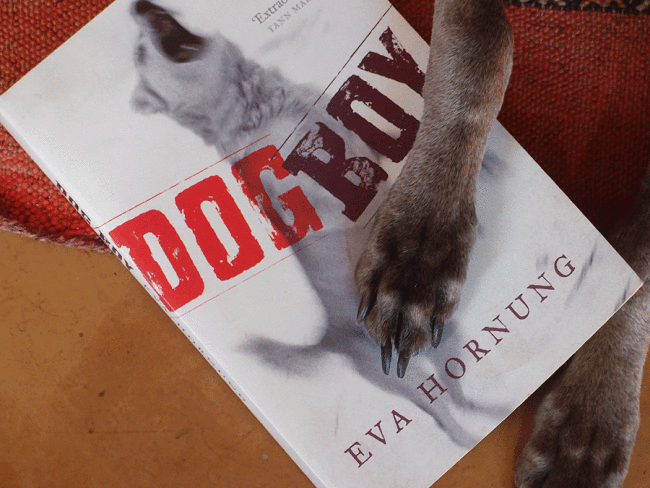By Eva Hornung
Published by Text Publishing, 2009
Yann Martel – he who wrote The Life of Pi, one of my favourite books of all time – describes Dog Boy as ‘Extraordinary’. This word is printed in quotation marks on the cover of the book, and it is the reason I picked it up from the pile of pre-loved tomes at my local second-hand book store. Of course I doubted it would be ‘Extraordinary’ – these superlatives are often found on the front of books I pick up and I am too often disappointed – but not this time.
Like The Life of Pi, Dog Boy is a story that uses animals to explore humanity. It is fascinating and shocking and heart wrenching, but it is compelling, and written with such insight into human and canine behaviour, that the events of the book are completely believable.
It is about a Russian boy, called Romochka, who is abandoned by his human carer and adopted by the matriarch of a family of feral dogs. It is an ancient story, but unique in its telling. From Romulus and Remus, to Tarzan, to Mowgli, myth and literature have placed helpless children in the care of wild animals and challenged us to rethink what it is to be human and what it is to be animal. They are never mutually exclusive states of being. When real life examples are found, and every now and then they are, we are horrified by the tale of human neglect and awed by the possibility of animal compassion.
Besides Romochka, most of the characters in Eva Hornung’s book are dogs. Without a hint of anthropomorphising, she has managed to convey their personalities and peculiarities as vividly as any human character, and so I was invested in the lives of these animals and convinced of the truth of their experience. I finished Dog Boy not only satisfied with a good read, and moved by a well told story, but with a feeling of having understood something that has always been beyond me. Let me explain.
As a child, I never had a dog and was generally wary. My own children were not going to be similarly deprived, and three years ago we bought a whippet who goes by the name of Bilbo. I have fed him and walked him and fallen in love with him, but I must admit that I have never understood him. Why, for instance, does he rub his neck in bird poo, why does he have to wee on every post and clump of grass, why does he love my husband more than me, and me more than my children? When I walk him and we come across other dogs I keep a wide berth, because I don’t understand them either, and I have always feared their barking and been perturbed by their need to sniff each other’s bottoms. Dog boy has been a revelation, a turning point in my understanding of these most beloved animals, and, while it may not have been the author’s intention, I am grateful for the lessons I have been taught by this book. Now, when I walk our dog, I show a little more respect for the social conventions of his species; I let him sniff bottoms and wee where he likes. And I watch him: I’ve noticed that he tolerates small children more than big and I wonder, what would happen, if… ?
Whether you like dogs or not is irrelevant to your enjoyment of this book; it is about relationships and hardship, survival and hope. In a word Dog Boy is ‘extraordinary’ and it is now one of my all-time favourite books.
Produced and recorded for Radio Northern Beaches, Sydney

